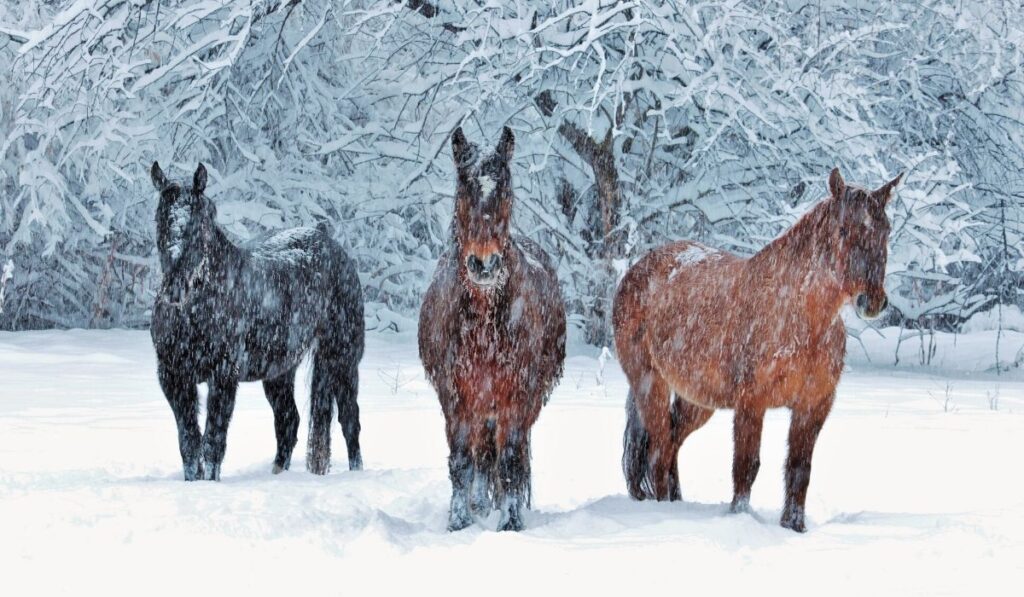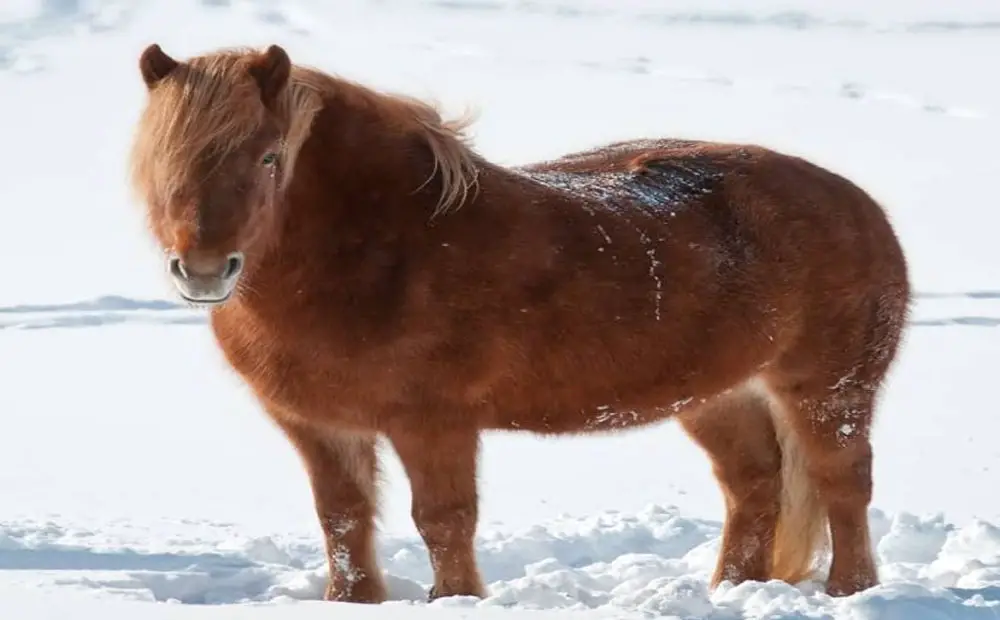The horse owners often get confused and asked do horses get cold. Yes, horses can get cold. They are very sensitive to temperature changes and if their body temperature drops too low, it can be dangerous for them. A horse’s natural winter coat is designed to help keep them warm in cold temperatures; however, a blanket or rug may still be necessary depending on the weather conditions.
If the temperatures drop below freezing then blankets should always be used as they provide extra insulation and protection from wind chill. Additionally, make sure your horse has access to shelter so that he/she can escape from strong winds and heavy rains.
Horses are incredibly hardy animals, but they can still get cold in the winter months. If a horse is not provided with enough shelter and protection from the elements, it can be at risk for hypothermia or frostbite just like any other animal. To keep your horse warm during cold weather, provide him/her with plenty of clean bedding to insulate against the ground’s chill as well as blankets that cover their body.
Additionally, make sure to check on your horse often and look out for signs of discomfort such as shivering or rubbing their coat excessively – these could be indicators that they’re too cold.
Do Horses Get Cold in the Rain
Horses are able to withstand cold temperatures better than human beings, however, they do still feel the effects of cold and wet weather. If a horse is exposed to cold rains for an extended period of time, he or she may become chilled and uncomfortable. It’s important to provide your horse with shelter in rainy weather or turn him out wearing a rain sheet or blanket that will protect him from wind and precipitation.
Additionally, it’s wise to inspect your horse periodically during rainy days for signs of hypothermia such as shivering and lethargy.

How Do I Know If My Horse is Cold?
If you’re wondering whether your horse is cold, there are a few signs to look out for. The most obvious sign of a chilly horse is if they start shivering. Horses will also try and move around more than usual when feeling the cold in an attempt to keep warm.
You may also notice that your horse’s coat starts looking duller or rougher which can be an indication of being too chilly. Your horse may have difficulty breathing or even start coughing due to the cold weather as well. Another common symptom of a horse being too cold is stiffness in their joints, particularly after exercise or when standing still for long periods of time.
To check on your horses comfort levels, take note of any changes in behaviour such as increased restlessness or irritability and pay attention to their coats and body temperature too – if it feels colder than normal then chances are they’re feeling the chill!
What Temperature Does a Horse Need a Blanket?
It is important to keep a horse warm and comfortable in cold weather, as horses can suffer from the same cold weather conditions that humans do. The amount of warmth required for a horse depends on its breed, age, health status, and the coat thickness. Generally speaking, it’s best to provide some sort of blanket when temperatures drop below 40 degrees Fahrenheit (4°C).
As with other animals such as cats and dogs, blankets are necessary for keeping your horse dry and warm during winter months. A waterproof sheet or rug should be used if there is heavy rain or snowfall; this will also help keep your horse’s hair clean by preventing mud from sticking to them. Blankets should fit snugly around the neck area but not so tightly that they cause chafing; any extra material can be trimmed off with scissors.
It’s also advisable to add an extra layer of insulation between the blanket and skin by using a liner – fleece works well at keeping heat inside while still allowing air circulation which helps prevent sweating. Additionally, leg wraps can help protect against wind chill if you’re riding out in extreme temperatures – just make sure these don’t constrict movement too much!
Should I Blanket My Horse?
When it comes to deciding whether you should blanket your horse or not, there are a few factors to consider. First of all, horses have thick coats that provide them with natural insulation against the elements. Blanketing can also be beneficial if your horse is clipped and does not have as much protection from the cold weather.
Blankets can also help reduce muscle soreness after exercise by keeping the muscles warm and allowing for better recovery time. If you decide to blanket your horse, make sure that you use one made specifically for horses rather than one meant for humans; this will ensure proper fit and coverage while still allowing air circulation so your horse doesn’t overheat. Additionally, it’s important to check regularly on how hot or cold your horse is under the blanket – blankets are designed to keep him comfortable but not too warm!
It’s also essential to be aware of any signs of skin irritation or rubbing due to an ill-fitting blanket; if necessary adjust straps accordingly or switch out for a different size/style of blanket in order to prevent discomfort. Ultimately, deciding whether or not you should blanker your horse depends on his individual needs; weigh up both pros and cons before making a decision that suits you both best!
What Happens When a Horse Gets Too Cold?
When a horse gets too cold, it can have serious consequences. The biggest risk is the potential for hypothermia, which is when the body temperature drops below normal and can’t warm itself back up. This can cause lethargy, shivering, weakness and confusion in horses.
In extreme cases of hypothermia, it may even lead to death if untreated. Additionally, being exposed to cold temperatures can increase a horse’s susceptibility to illness such as pneumonia or colic due to weakened immune systems from not having enough energy stored up for warmth. Horses living in climates with colder winters should be well insulated with blankets and shelter so that they are able to maintain their body temperature within safe levels.
Night Time Winter Check On The Horses (Are They Cold?)
Conclusion
This blog post has demonstrated that horses can indeed get cold, just like humans. It is important to make sure your horse is adequately clothed during cold weather, as it can help protect their health and well-being. Additionally, providing adequate shelter for your horse during the winter months will ensure they are comfortable and protected from adverse weather conditions.
Ultimately, this blog post has shown that being aware of the temperature changes in your area will help you determine what type of clothing or shelter may be needed for your horse’s protection against chilling temperatures.
Janet G Kulick is an experienced horse rider, trainer, and owner of the informative horse blog, Horseray.com. Her engaging writing style and wealth of knowledge on horse care, riding, and training make her a trusted source for horse enthusiasts worldwide.






